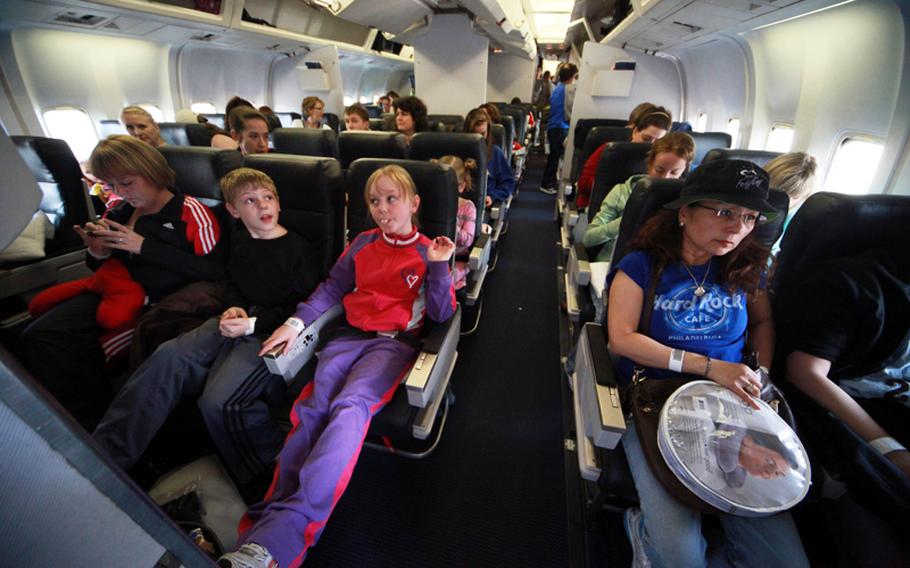
U.S. military family members prepare to take off from Yokota Air Base, Japan, last month as part of the authorized voluntary dependent departure. The Defense Department lifted the departure order Friday - allowing dependents to return to Japan. (Grant Okubo/Stars and Stripes)
YOKOSUKA NAVAL BASE, Japan – The Defense Department lifted its voluntary departure order for military family members Friday, allowing thousands of spouses and children who fled Japan amid earthquake and radiation concerns to return.
The military action follows a similar move by the State Department a day earlier for family members of its employees in Japan.
“The Defense Department concurs with the State Department’s determination that the situation in Japan does not pose significant risk to U.S. citizens,” the military’s Joint Support Force wrote in a statement. “We will continue to ensure the safety of our families is at the forefront of every decision we make.”
Between 9,000 and 10,000 family members left Japan after the March 11 earthquake, about 7,800 of which left on military-funded orders, according to Defense Department data.
Lodging funds and allowances for families that left on military-funded orders will end for most on April 25, according to a Pentagon news release.
Families with military sponsors will be allowed to continue collecting allowances if they have enrolled children in a new school and want to wait until that school year ends. Allowances will end the day after the school semester ends, according to a Pentagon news release. Families with civilian sponsors in the same situation must apply for transitional separate maintenance allowance through their command, according to a Defense Travel Management Office memo.
School officials are asking families to notify base schools in Japan that their children are returning, either by phone or email. Parents with questions can also contact the Department of Defense Education Activity’s crisis team at DSN: 644-5652, or from the U.S. by dialing 011-81-611-744-5652.
Parents in Japan can email evacuation.japan@pac.dodea.edu, while parents in the U.S. can email evacuation@hq.dodea.edu.Continued safe haven funding for families whose military sponsor is due for a permanent change of station within the next 60 days is subject to each service’s discretion, according to a message from the Joint Support Force, which includes U.S. Forces Japan. The same goes for families whose civilian sponsor is due to change stations in 30 days.The Navy has already announced it will end safe haven funding by April 25 for families changing duty stations, and that those families should begin making plans to travel to the new duty station, according to a Navy administrative message. Such families are not allowed to return to Japan without a waiver.
Military families who left under the voluntary departure order can make official travel reservations through CWTSato Travel by calling 1-855-794-4926, or by e-mail at cwtsatotravel.com, officials said.
Travelers can fill out a reservation form by clicking here.
The Defense Travel Management Office is answering questions regarding returns to Japan at 1-888-435-7146.
Some commands are also processing flight reservations through installation personnel sections. For information, families can contact their command liaison or ombudsman.Narita International Airport will be the preferred arrival airport for returning families, U.S. Forces Japan spokesman Maj. Neal Fisher said Saturday.
The military may schedule additional airport shuttle buses for families returning to Kanto-area military bases, Fisher said.
“It shouldn’t be too different from what most folks who travel back forth are used to,” Fisher said. “The main difference being that they’re not paying for their own tickets.” Although military family members can return up to two pets at government expense, civilian-sponsored family members must pay for pet transit, according to the Joint Support Force.
On May 1, shore-based servicemembers in the 18 prefectures where families were voluntarily evacuated will stop receiving the $50 per month in location-based hardship pay that was authorized in late March.
Civilians receiving 10 percent of their base pay as post differential will no longer get that money as of their next paycheck, said Defense spokeswoman Cmdr. Leslie Hull-Ryde in a Pentagon news release.